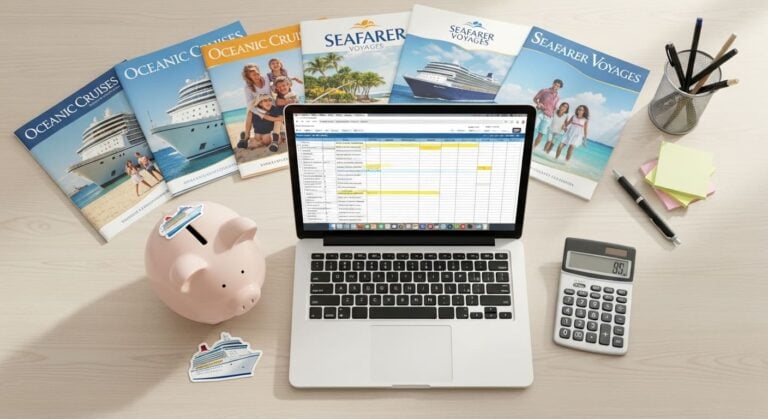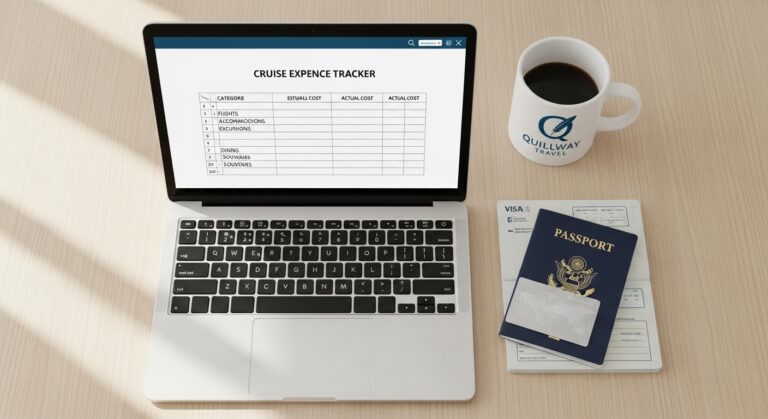The 5 Most Important Family Vacation Survey Questions to Ask
As the Family C.E.O., one of your greatest strengths is your desire to make everyone happy. You want to ensure every voice is heard, from the youngest grandchild to the most senior grandparent. When planning the big family vacation, this instinct might lead you to open the floor with a seemingly simple question: “So, where does everyone want to go this year?” That’s where family vacation survey questions can come in handy, helping to gather ideas before the discussion turns into chaos.
While well-intentioned, this is often the first step toward chaos. Suddenly, you're inundated with a dozen conflicting dreams. Your sister-in-law wants a cultural tour of Italy, your teenage nephew wants a beach with a surf school, your parents want something relaxing and close to home, and the grandkids just keep shouting, “Disney!” You're left with a list of impossible-to-reconcile ideas and the immense pressure of having to choose a “winner,” inevitably disappointing everyone else.
The key to success is to shift from an open forum to a guided democracy. You can make everyone feel valued and included while still maintaining control and structure. The most effective tool for this is a short, strategic survey.
The Power of the Right Questions
Using a free tool like Google Forms, you can create a simple survey that takes each family unit just five minutes to complete. This is far superior to a chaotic group text or email chain. It allows people to give their honest opinions without being influenced by others' responses, and it provides you with organized, concrete data to build a framework for your decision.
The secret lies in avoiding vague, open-ended questions. Your goal is not to collect a list of dreams; it is to gather actionable data. Here are the five essential questions you need to ask.
1. The Budget Question
This is the most critical—and often most awkward—topic to breach, so it's best to handle it with clear, impersonal options.
- The Question: “To help me find the best options, what is a comfortable per-person budget for this trip (including flights)?”
- The Options: Provide clear ranges, such as: $1,500-$2,000, $2,000-$2,500, $2,500+
- Why it Works: Asking for a specific number can be intimidating. Providing ranges makes it easy for people to answer honestly and privately. This single piece of data is the most important filter for all future decisions and immediately eliminates options that are not financially viable for the entire group.
2. The Timing Question
Instead of a confusing back-and-forth about school schedules and work calendars, lead the process with pre-selected choices.
- The Question: “Which of the following date ranges work best for your family?”
- The Options: Provide 2-3 specific, pre-researched, week-long options.
- Why it Works: This shows leadership. You've already done the homework to identify windows that might work (e.g., considering school holidays or peak season pricing). This narrows the calendar down immediately and prevents endless debate.
3. The Vacation Pace Question
Think of this as the “vibe check” for your family. It helps you understand the group's collective energy level.
- The Question: “What is your ideal vacation style?”
- The Options: a) Maximum Relaxation, b) A Mix of Action & Downtime, c) Non-Stop Adventure.
- Why it Works: This simple question prevents major mismatches, like booking a high-octane adventure tour when half the group secretly wants to read by the pool. It’s the key to deciding between a laid-back all-inclusive, a bustling city tour, or a cruise that can expertly offer all three paces at once.
4. The “Must-Do” Question
This question helps you identify the single most important element of the trip for each family unit.
- The Question: “What is the #1 type of activity that would make this trip a home run for your family?”
- The Options: Provide categories like Beautiful Beaches, Historical Sightseeing, Amazing Food, Live Entertainment, Kids' Activities.
- Why it Works: By forcing the choice of just one “must-do,” you get to the core of what each person values most. You can then look for a destination or vacation style (like a cruise) that can satisfy the largest number of these top priorities.
5. The “Deal-Breaker” Question
This is your safety net. It’s the one open-ended question designed to catch critical, non-negotiable needs.
- The Question: “Is there anything that would be a deal-breaker for you?”
- Why it Works: This is where you'll uncover essential information like “Grandma needs wheelchair-accessible rooms,” “My son has a severe nut allergy,” or “I need reliable WiFi to handle a work emergency.” Catching these deal-breakers at the survey stage prevents a potential disaster down the line.
Lead with Data, Plan with Confidence
Using these five simple questions transforms you from a stressed-out order-taker into a strategic and respected leader. It provides you with clear, actionable data that reflects your family's true priorities. With this information in hand, you can confidently make the final call, knowing your decision is backed by a process that was both inclusive and incredibly effective.
After you've gathered all this valuable feedback, you'll need a central place to announce the final decision and keep everyone updated. Learn why a private Facebook Group is the best app for planning group travel communication.
This survey is a crucial part of the leadership phase in trip planning. To see how to use this data and manage the rest of the process, read our Ultimate Guide on How to Plan a Group Vacation Without Losing Your Mind.
Join The Sunday Journey
Where family connection meets effortless coordination
Receive weekly inspiration, practical wisdom, and heartfelt stories about creating beautiful, seamless travel experiences for the whole family.
I respect your privacy. Unsubscribe at any time. Your information will never be shared.






